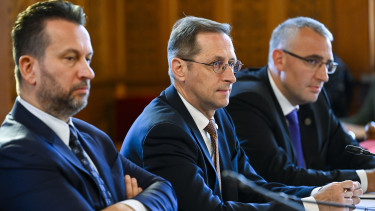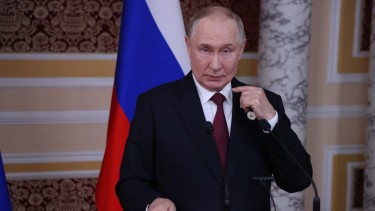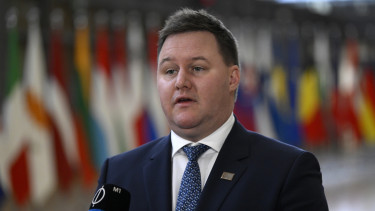Economy
Head of EU executive lends an ear to eurosceptic eastern states
Save article
Share
Scallops, successful meeting, excellent debate
It is the first time Juncker has met in this more intimate format the Prime Ministers of the Visegrad Four countries, Bohuslav Sobotka, Viktor Orbán, Beata Szydlo and Robert Fico respectively in the Commission's Berlaymont headquarters.Poland, Hungary, Slovakia and the Czech Republic highlighted the positive after their leaders dined with Jean-Claude Juncker of the European Commission over scallops with Jerusalem artichokes and venison medallions on the eve of an EU summit starting in Brussels on Thursday.
"On the menu: consensus through compromise and cooperation. Unity," Juncker said.
According to Hungarian PM Viktor Orbán’s evaluation, the Wednesday meeting of the V4 and President Juncker was successful, fruitful and useful, János Lázár, the Minister heading the Prime Minister’s Office said at the press conference on Thursday.
Czech EU affairs minister Ales Chmelar said the five had an "excellent debate". Another diplomat from one of the four states said their delegation was pleased by Juncker's apparent readiness to listen to their arguments.
No decisions were made public after the meeting, but the mere fact of the lengthy dinner was intended as a gesture by the Commission to woo the reluctant states closer, Reuters added.
Brussels has annoyed the ex-communist countries by embracing calls for faster and deeper integration, demanding they take in refugees, and contemplating restrictions on the right of their citizens to work in wealthier EU states for lower salaries than native workers receive.French President Emmanuel Macron says cheap labour from eastern Europe puts his people at a competitive disadvantage, and is pushing to curb that right with the backing of Belgium, the Netherlands and other more-developed EU states.
After EU leaders are expected to discuss the matter on the sidelines of their two-day summit, their ministers will try to seal an agreement on the divisive issue at further talks in Luxembourg on Monday.
Poland and Hungary, with nationalist populist governments, also have a number of disputes with Brussels over upholding democratic principles and ensuring judicial independence.
Such issues have fuelled talk in the EU that the reluctant easterners could be left behind as others in the bloc seek to deepen their ties in the wake of Britain's exit.
Poland and Hungary both have lost court cases recently at the European Court of Justice and vowed to challenge the rulings.
East-west divide?
Italy has been going even further in calling on the bloc to take away some of the generous EU handouts the easterners receive to punish them for failing to show enough solidarity on handling migration and undercutting the rule of law."The EU 27 must avoid any splitting into east or west," said the Czech Republic's outgoing Prime Minister Bohuslav Sobotka."We agreed... that any further discussion on the future of the EU must be led in the format of 27 member states. No member state can be excluded from these negotiations. All states must be treated equally."
Sobotka is likely to be replaced in an election this weekend by tough-talking billionaire Andrej Babis, who has often criticised Brussels and the bloc's push for all member states to host some asylum seekers who make it to Europe.
Orbán was of the opinion that the V4 countries expressed concordant views on every issue, and they managed to demonstrate to the President of the Commission that this is a close, effective and successful co-operation. Lázár noted.
At the working dinner, Hungary, together with its V4 partners, stressed that there cannot be double standards between the Western and Eastern Member States. The application of double standards vis-a-vis the Central-European countries is a daily practice on the Commission’s part: "what is allowed in the West is forbidden in the East".
While the V4 countries had made themselves known as broadly eurosceptic, EU diplomats warn against a generalisation that the division between eastern and western EU member states is growing, EuObserver reported earlier this week.
For one thing, the V4 are not united either.
The illiberal path taken by Poland and Hungary has caused clashes with the EU executive over rule-of-law concerns, and both Warsaw and Budapest have accused Brussels of political interference.
Eurozone-member Slovakia has toned down its eurosceptic rhetoric since the country held the EU's rotating presidency, and in August PM Robert Fico said his country wants to belong to the core of Europe.
The Czech Republic has been sitting on the fence, but a possible populist win in the elections this weekend could push it into the staunchly eurosceptic camp.
"I would be careful with labels. If you put the label 'east' on a country, it will be inclined to react as an 'eastern' country," one source warned.





